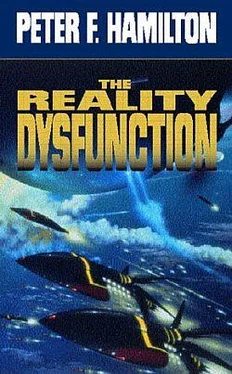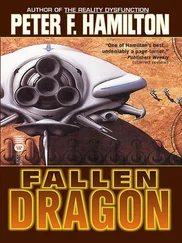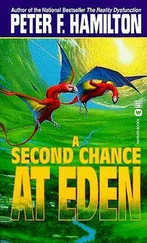The Skibbows and the Kavas were among the families who had visions of filling the vast, empty savannah with huge herds of meat-laden beasts. They slept in a tent on the edge of the jungle for five weeks while Gerald and Frank assembled their new home, a four-room log cabin with a stone fireplace, and solar panels nailed on the roof to power lights and a fridge. Outside, they built a small lean-to barn and a stockade; then dammed the little nearby stream with grey stones to form a pool they could wash and bathe in.
Four months and three days after the Swithland departed, they split open their seventeen marsupium shells (three had been stolen at the spaceport). The animals were curled up in a form-fitting sponge, almost as though they were in wombs, with tubes and cables inserted in every orifice. Fifteen made it through the revival process: three shire-horse foals, three calves, one bison, three goats, four lambs, and an Alsatian pup. It was a healthy percentage, but Gerald found himself wishing he could have afforded zero-tau pods for them.
All five family members spent the day helping the groggy animals stand and walk, feeding them a special vitamin-rich milk to speed recovery. Marie, who had never even patted a living animal before let alone nursed one, was bitten, peed on, butted, and had the yellowy milk spewed up over her dungarees. At nightfall she rolled into bed and cried herself to sleep; it was her eighteenth birthday, and no one had remembered.
Rai Molvi made his way across the clearing towards the jetty where the tramp trader boat was waiting, exchanging greetings with several adults. He felt a surge of pride at what he saw, the sturdy buildings, neat stacks of timber, fish smoking over open fires, danderil hides pegged out on frames to dry in the sun. A well-ordered community chasing a common goal. The LDC could use Aberdale in its promotional campaign without any falsehood, it was exemplary.
A second wave of tree felling had been underway for a month now, cutting rectangular gashes deep into the jungle around the perimeter of the clearing. From the air the village resembled a gear cog with exceptionally long teeth. The colonists were starting to cultivate the new fields, digging out the tree stumps, ploughing the soil with rotovators that charged from solar cells, planting their vegetable plots and fruit groves. Lines of small green shoots were already visible, pushing up through the rich black soil, and the farmers had to organize a bird patrol to scare off the hungry flocks perched waiting in the surrounding trees.
Not all of the Earth seeds had germinated successfully, which was surprising because they were geneered for Lalonde’s environment. But Rai had every confidence the village would triumph. Today’s fields would become tomorrow’s estates. In six months they had accomplished more than Schuster had in eighteen. It was down to effective organization, he felt. His council was acknowledged as a stroke of salutary foresight, organizing them into an effective interactive work unit even back in the transients’ dormitory.
He passed the community hall and stood to one side to let a group of children march by, carrying braces of fat polot birds they had caught in their traps. Their skin was scratched from thorns, and their legs were coated in mud, but they were smiling and laughing. Yes, Rai Molvi felt very good indeed.
He reached the jetty and walked its length. A couple of Ivets were in the river, Irley and Scott, hauling up their creels full of mousecrabs. The creels were adaptations of lobster-pots, one of Quinn’s ideas.
Rai waved at the two lads, receiving a grinning thumbs-up. The Ivets were undoubtedly his greatest success. A month after they had arrived, Quinn Dexter had asked to talk to him. “Anything we say to Powel Manani just gets automatically ignored, but we know you’ll give us a fair hearing, Mr Molvi.”
Which was so true. It was his job to arbitrate, and like it or not, the Ivets were part of Aberdale. He must appear strictly impartial.
“We want to organize ourselves,” Quinn had said earnestly. “Right now you have all eighteen of us working for you each day, but you have to feed us and let us live in the hall. It’s not the best arrangement, because we just sweat our arses off for you and don’t get anything out of it for ourselves, so we don’t give a hundred per cent, that’s only human nature. None of us asked to come to Aberdale, but we’re here now, and we want to make the most of it. We thought that if we had a rota so that thirteen of us are available as a general work team each day, then the remaining five could use the time to build something for ourselves, something to give us a bit of pride. We want to have our own cabin; and we could trap and grow our own food. That way you don’t have to support us, and you get a far more enthusiastic work team to help put up your cabins and fell the trees.”
“I don’t know,” Rai had said, although he could see the logic behind the idea. It was just Quinn he was unsettled over; he had encountered waster kids back in the arcology often enough, and Quinn’s sinewy frame and assertive mannerisms brought the memories back. But he didn’t want to appear prejudicial, and the lad was making an honest appeal which might well be beneficial to the whole community.
“We could try it for three weeks,” Quinn suggested. “What have you got to lose? It’s only Powel Manani who could say no to you.”
“Mr Manani is here to help us,” Rai answered stiffly. “If this arrangement is what the town council wants, then he must see that it is implemented.”
Powel Manani had indeed objected, which Rai thought was a challenge to his authority and that of the council. In a session to which Powel Manani was not invited, the council decided that they would give the Ivets a trial period to see if they could become self-sufficient.
Now the Ivets had built themselves a long (and very well constructed, Rai grudgingly conceded) A-frame building on the eastern side of the clearing where they all lived. They caught a huge number of mousecrabs in their creels, which they traded for other types of food among the other villagers. They had their own chicken run and vegetable allotments (villagers had chipped in with three chicks and a few seeds from their own stocks). They joined the hunting parties, even being trusted to carry power weapons, although those did have to be handed back at the end of the day. And the daily work team were enthusiastic in the tasks they were given. There was also some kind of still producing a rough drink, which Rai didn’t strictly approve of, but could hardly object to now.
It all added up to a lot of credit in Rai Molvi’s favour for pushing the idea so hard. And it wouldn’t be long before the time was right for Aberdale to think about formally electing a mayor. After that, there was the county itself to consider. Schuster town was hardly flourishing; several of its inhabitants had already asked if they could move to Aberdale. Who knew what a positive, forthright man could aspire to out here where this world’s history was being carved?
Rai Molvi came to the end of the jetty flushed with a strong sense of contentment. Which was why he was only slightly put out by a close-up view of the Coogan. The boat was twenty metres long, a bizarre combination of raft and catamaran. Flotation came from a pair of big hollowed-out trunks of some fibrous red wood, and a deck of badly planed planks had been laid out above them, supporting a palm-thatched cabin which ran virtually the whole length. The aft section was an engine house, with a small ancient thermal-exchange furnace, and a couple of time-expired electric motors used by the McBoeings in their flap actuators which the captain had salvaged from the spaceport. Forward of that was a raised wheel-house, with a roof made entirely of solar panels, then came the galley and bunk cabin. The rest of the cabin was given over to cargo.
Читать дальше












